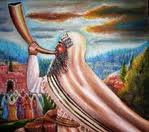Portion V'ayeilech

Shmitah & Hakhel
In the Portion of V'ayeilech we read about the commandment of 'Hakhel'. This commandment involved 'gathering together' the Jewish people in the courtyard of the Holy Temple once every seven years, "at the end of each Shemitah", the Sabbatical year. The King would read out certain passages from the book of Devarim, so that the people would "learn to be in awe of G-d…, carefully observing all the words of this Torah".
Since the Torah connects Hakhel with Shemitah, it is to be understood that the inspiration provided by the Shemitah year is carried over into the following six non – Shemitah years, through the medium of the Hakhel ceremony. What is this inspiration and how is it mirrored in the commandment of Hakhel?
The commandment of Shemitah as whole involved giving the land a "rest period, a Sabbath to G-d". during this time fields were not to be planted, and crops that sprouted spontaneously were not to be harvested. Shemitah served to demonstrate to the Jew that "nothing was wholly his own; all was G-d's possession".
There are three general aspects to Shemitah:
A. Man's rest;
B. The earth's rest;
C. The law that the fruits that grow during the Shemitah year are ownerless and may be eaten by all.
Each of these three aspects emphasizes a different facet of G-d's dominion.
Man's resting during Shemitah from agricultural labor which was the main occupation of Jewry in ancient time's stresses G-d's dominion and supremacy over man: "I was created to serve my Master." When a Jew is occupied with worldly affairs he may forget that the ultimate intent of his being created is that he be a servant of G-d.
The Shemitah year, during which time the Jew divorces himself completely from worldly matters and occupies himself wholly with spiritual matters, serves to reinforce his awareness of G-d's dominion. Its effect is felt not only during the Shemitah year itself, but also during the following six years of labor.
The earth's resting emphasizes G-d's dominion over the whole earth, including nature and natural laws. As the Torah says: "You may ask, what will we eat in the seventh year? We have not planted nor have we harvested crops.' I will direct my blessing to you in the sixth year, and [the land] will produce enough crops for three years." G-d here demonstrates that when He so desires the earth produces crops through supranatural means.
This serves as a lesson to be borne in mind during the six years of labor – that ultimately, the crops produced through planting and sowing do not result from man's labor but from G-d's blessing.
This third aspect of Shemitah, that the fruits of the seventh year are ownerless and may be taken freely, establishes that G-d is the proprietor of man's possessions; even after G-d blesses an individual with property and wealth He retains ownership.
This reminds the individual during the six years following Shemitah, when he may keep the fruits of his labors that these fruits indeed belong to G-d; they were merely entrusted to him so that he may act as G-d's agent and utilize them for the
fulfillment of His will.
Herein lies the connection of 5hemitah and Hakhel main part of the first section read by the king during Hakhel ceremony was the passage of Shema, which relates , the Jew's spiritual labors - accepting the heavenly yoke, studying Torah, and performing mitzvos. This is similar to man's resting during Shemitah so that he may devote himself entirely to G-d.
The second portion read during Hakhel deals with material rewards for the performance of mitzvos - harvesting bountiful crops, and the like. This, like the second aspect of Shemitah, indicates that a Jew's material bounty is dependent on his relationship with G-d.
The third section read during Hakhel involves tithing. Like the third aspect of Shemitah, this indicates that G-d retains ownership of man's possessions. They are merely entrusted to him, and when G-d so desires, He directs a man to tithe, and contribute to the welfare of a fellow Jew.